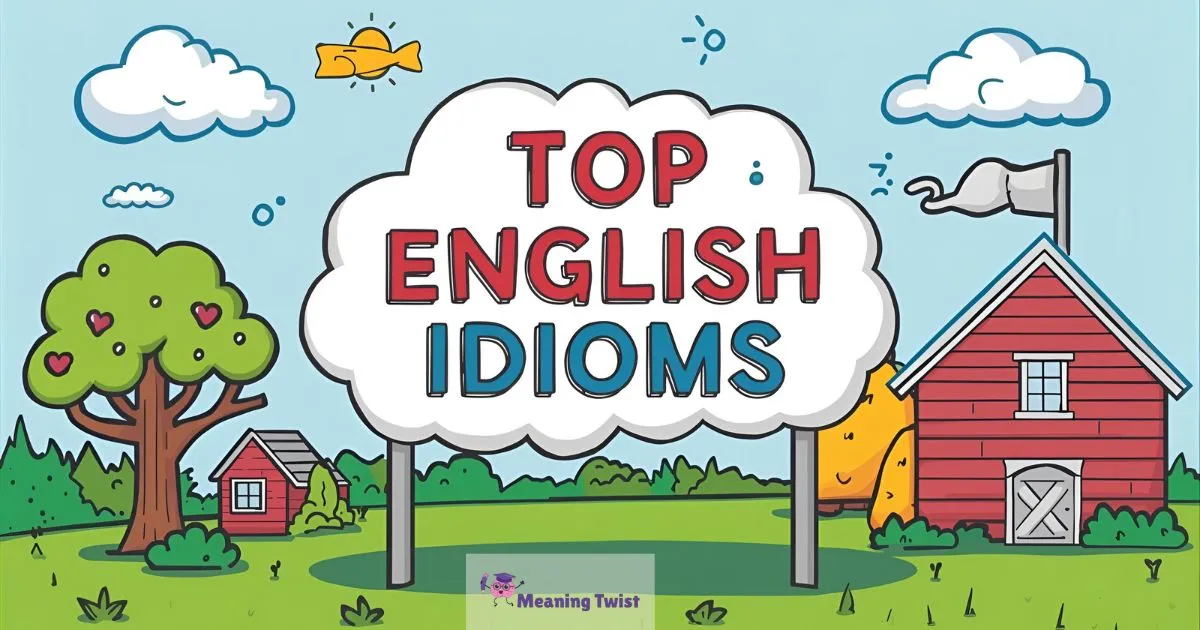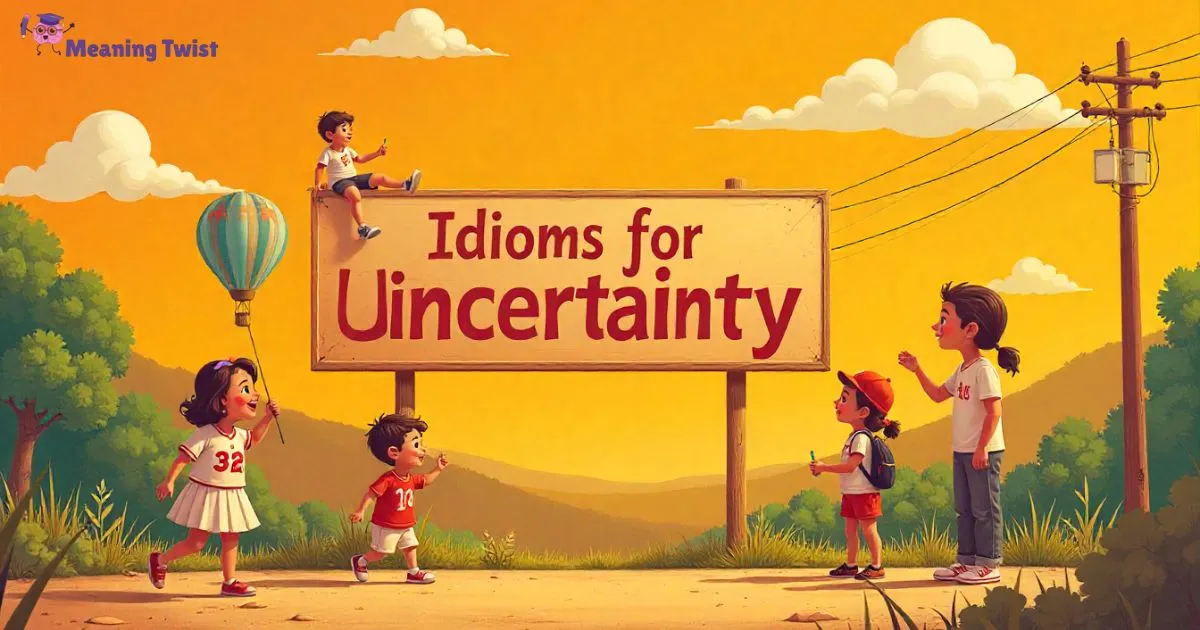If you’ve ever wondered how fluent speakers sound so natural, the secret often lies in their use of idioms. These short, colorful phrases make conversations expressive and full of personality. They help you go beyond plain English and sound more creative, confident, and fluent.
Whether you’re chatting with friends, writing captions, or preparing for English exams, idioms instantly level up your communication. Use them to express feelings, add humor, or describe everyday situations in a smarter way. The more you use them, the more natural you’ll sound.
Idioms make your speech more vivid, memorable, and human. They add rhythm to your words and emotion to your meaning. Mastering them helps you connect better — whether you’re learning English for fun, travel, or professional growth.
1. Break the Ice
Meaning: Start a friendly conversation in an awkward situation.
Scenario: Meeting someone for the first time.
Tip: Great for social introductions.
Real Life Example:
At the new office party, Ali told a funny story to break the ice and everyone started chatting comfortably.
2. Hit the Nail on the Head
Meaning: Say something exactly right.
Scenario: When someone gives a perfect answer.
Tip: Use it to praise sharp thinking.
Real Life Example:
When Sara guessed the reason for the delay, her boss said, “You really hit the nail on the head!”
3. Piece of Cake
Meaning: Something very easy to do.
Scenario: Tasks or exams that feel effortless.
Tip: Use it casually to show confidence.
Real Life Example:
“That test was a piece of cake,” said Bilal as he left the classroom smiling.
4. Under the Weather
Meaning: Feeling sick or unwell.
Scenario: When you’re ill or tired.
Tip: Perfect for polite explanations.
Real Life Example:
Hira skipped the meeting because she was under the weather, needing rest and tea.
5. Once in a Blue Moon
Meaning: Something that happens rarely.
Scenario: Rare events or behaviors.
Tip: Sounds poetic and natural.
Real Life Example:
Arif only cleans his room once in a blue moon, and today was that miracle day.
6. The Ball Is in Your Court
Meaning: It’s your turn to take action.
Scenario: Decision-making situations.
Tip: Use it to encourage responsibility.
Real Life Example:
“I’ve done my part,” said Ayesha. “Now the ball is in your court, Bilal.”
7. Kill Two Birds with One Stone
Meaning: Achieve two goals with one effort.
Scenario: Efficient multitasking moments.
Tip: Great for smart planning.
Real Life Example:
By biking to work, Fahad saves money and stays fit — killing two birds with one stone.
8. Bite the Bullet
Meaning: Face something difficult bravely.
Scenario: Dealing with tough situations.
Tip: Motivational and strong in tone.
Real Life Example:
Even though she feared public speaking, Sana decided to bite the bullet and give her presentation.
9. Burn the Midnight Oil
Meaning: Work late into the night.
Scenario: Study or work-related efforts.
Tip: Common in student life.
Real Life Example:
Exams were near, so Ali burned the midnight oil to finish his revision.
10. A Blessing in Disguise
Meaning: Something that seems bad but turns out good.
Scenario: Unexpected positive outcomes.
Tip: Use for life lessons or hope.
Real Life Example:
Losing that job was a blessing in disguise; it led her to start her dream business.
11. Let the Cat Out of the Bag
Meaning: Reveal a secret by accident.
Scenario: When someone shares private news.
Tip: Fun for casual conversation.
Real Life Example:
Ahmed let the cat out of the bag about the surprise party, ruining the suspense.
12. Call It a Day
Meaning: Stop working for now.
Scenario: When finishing tasks.
Tip: Common in workplaces.
Real Life Example:
After hours of coding, the team decided to call it a day and rest.
13. Hit the Sack
Meaning: Go to bed.
Scenario: When you’re tired.
Tip: Informal and friendly.
Real Life Example:
It’s been a long day; I’m ready to hit the sack and sleep deeply.
14. Add Fuel to the Fire
Meaning: Make a bad situation worse.
Scenario: During arguments or stress.
Tip: Use it when things escalate.
Real Life Example:
His sarcastic reply only added fuel to the fire, making his friend angrier.
15. Costs an Arm and a Leg
Meaning: Very expensive.
Scenario: Talking about costly items.
Tip: Great for daily spending jokes.
Real Life Example:
This new phone costs an arm and a leg, but I couldn’t resist buying it.
16. Spill the Beans
Meaning: To reveal a secret.
Scenario: When someone shares hidden information.
Tip: Perfect for fun, casual gossip moments.
Real Life Example:
When Hira accidentally told everyone about the proposal, she realized she had spilled the beans without meaning to.
17. Pull Someone’s Leg
Meaning: To joke or tease someone playfully.
Scenario: For lighthearted humor among friends.
Tip: Use it when making friendly jokes.
Real Life Example:
When Bilal said he met a celebrity, we didn’t believe him. “Relax, I’m just pulling your leg,” he laughed.
18. Hit the Road
Meaning: To leave or start a journey.
Scenario: Great for travel or goodbyes.
Tip: Perfect for casual conversation.
Real Life Example:
We packed our bags early to hit the road before sunrise for our weekend getaway.
19. Bite Off More Than You Can Chew
Meaning: Take on more responsibility than you can handle.
Scenario: For overcommitment or stress.
Tip: Great life lesson idiom.
Real Life Example:
Hina agreed to manage two projects at once and soon realized she had bitten off more than she could chew.
20. Cry Over Spilled Milk
Meaning: To be upset about something that can’t be changed.
Scenario: Perfect for comforting or advising.
Tip: Use it to remind others to move on.
Real Life Example:
After losing the match, the coach said, “Don’t cry over spilled milk; let’s prepare for the next game.”
21. Let Sleeping Dogs Lie
Meaning: Avoid restarting old arguments or problems.
Scenario: Great for peacekeeping situations.
Tip: Use it when avoiding drama.
Real Life Example:
I wanted to confront him, but my friend said, “Better to let sleeping dogs lie and stay calm.”
22. On Cloud Nine
Meaning: Extremely happy.
Scenario: Describing moments of joy.
Tip: Great for personal stories or captions.
Real Life Example:
When Sana got her dream job, she was on cloud nine for weeks, smiling nonstop.
23. Burn Bridges
Meaning: Destroy relationships or opportunities permanently.
Scenario: For warning or reflection.
Tip: Use it thoughtfully.
Real Life Example:
Arif left his company angrily, but later regretted burning bridges with his former boss.
24. The Best of Both Worlds
Meaning: Enjoying two benefits at once.
Scenario: Perfect for positive comparisons.
Tip: Use it when describing balance.
Real Life Example:
Working from home lets me earn money and spend time with family — truly the best of both worlds.
25. Actions Speak Louder Than Words
Meaning: What you do matters more than what you say.
Scenario: Common motivational idiom.
Tip: Ideal for leadership or advice.
Real Life Example:
Ali promised to help but never showed up. His teacher reminded him, “Actions speak louder than words.”
26. When Pigs Fly
Meaning: Something that will never happen.
Scenario: Used for sarcasm or humor.
Tip: Perfect for light teasing.
Real Life Example:
Zain said he’d clean his room. His sister laughed, “Yeah, right — when pigs fly!”
27. The Early Bird Catches the Worm
Meaning: Success comes to those who act quickly.
Scenario: Used to encourage punctuality or effort.
Tip: Great motivational idiom.
Real Life Example:
Hina woke up early to apply for the scholarship — and won! Truly, the early bird catches the worm.
28. Rome Wasn’t Built in a Day
Meaning: Important things take time.
Scenario: Perfect for patience and persistence.
Tip: Great for motivation and advice.
Real Life Example:
When Bilal struggled to learn guitar, his teacher said, “Remember, Rome wasn’t built in a day.”
29. The Ballpark Figure
Meaning: An approximate number or guess.
Scenario: Common in business or planning.
Tip: Use when you don’t need exact numbers.
Real Life Example:
The manager gave a ballpark figure of $10,000 for the new project’s budget.
30. Every Cloud Has a Silver Lining
Meaning: There’s always something good in a bad situation.
Scenario: Ideal for comfort or motivation.
Tip: Great for optimistic talks.
Real Life Example:
After failing his first exam, Ahmad realized it was a chance to improve. His mom said, “See? Every cloud has a silver lining.”
31. Jump on the Bandwagon
Meaning: To join a popular activity or trend just because others are doing it.
Scenario: Use when someone starts supporting something only after it becomes popular.
Tip: Great for discussing fads, sports teams, or social trends.
Real Life Example:
When everyone started investing in crypto, Ali quickly joined too. His friends laughed, saying, “Look who’s jumped on the bandwagon!”
32. Keep an Eye On
Meaning: To watch something or someone carefully.
Scenario: Fits when you’re monitoring progress or behavior.
Tip: Use it for both people and things.
Real Life Example:
Mom asked Sara to keep an eye on the soup while she made a call. Sara nodded — multitasking at its best!
33. Let the Cat Out of the Bag
Meaning: To accidentally reveal a secret.
Scenario: Perfect when someone spoils a surprise.
Tip: Works great in fun storytelling.
Real Life Example:
Ahmed couldn’t hold his excitement and let the cat out of the bag about his sister’s surprise party.
34. Bite the Bullet
Meaning: To do something unpleasant or difficult with courage.
Scenario: When facing tough choices or challenges.
Tip: Encourages bravery.
Real Life Example:
After weeks of hesitation, Zara finally bit the bullet and applied for her dream job.
35. Cry Over Spilled Milk
Meaning: To be upset about something that can’t be changed.
Scenario: Fits when comforting someone.
Tip: Ideal for positive encouragement.
Real Life Example:
“Stop crying over spilled milk,” Mom said kindly. “We’ll fix it next time!”
36. Break the Ice
Meaning: To make people comfortable in an awkward or new situation.
Scenario: Perfect for meetings, classes, or events.
Tip: Use it when trying to start conversations.
Real Life Example:
The teacher told a funny joke to break the ice on the first day of class.
37. The Ball Is in Your Court
Meaning: It’s your turn to take action or make a decision.
Scenario: Use when waiting for someone’s move.
Tip: Common in advice or relationships.
Real Life Example:
“I’ve done my part,” said Hamza. “Now the ball is in your court.”
38. A Piece of Cake
Meaning: Something very easy to do.
Scenario: Ideal when talking about simple tasks.
Tip: Great for casual speech.
Real Life Example:
The math quiz was a piece of cake for Ayesha — she finished in five minutes!
39. Burn the Midnight Oil
Meaning: To work or study late into the night.
Scenario: Perfect for students or workers on deadlines.
Tip: Often used in academic settings.
Real Life Example:
Finals week had everyone burning the midnight oil to finish assignments.
40. Actions Speak Louder Than Words
Meaning: What you do matters more than what you say.
Scenario: Fits when emphasizing sincerity.
Tip: Common in moral or motivational contexts.
Real Life Example:
Ali promised to help but never showed up — proving actions speak louder than words.
41. Beat Around the Bush
Meaning: To avoid talking directly about something.
Scenario: Use when someone is hesitant.
Tip: Great in debates or discussions.
Real Life Example:
“Stop beating around the bush and tell me what really happened,” Amina said firmly.
42. Cost an Arm and a Leg
Meaning: Something very expensive.
Scenario: Perfect for describing high prices.
Tip: Use it humorously in daily talk.
Real Life Example:
“This phone cost me an arm and a leg,” Bilal sighed. “But it’s worth it!”
43. On Cloud Nine
Meaning: Extremely happy.
Scenario: Ideal for joyful moments.
Tip: Use in positive, emotional contexts.
Real Life Example:
When her favorite singer liked her post, Hina was on cloud nine all day!
44. Pull Someone’s Leg
Meaning: To tease or joke with someone.
Scenario: Use in friendly teasing.
Tip: Perfect for casual humor.
Real Life Example:
Don’t get angry — I was just pulling your leg about the surprise!
45. The Early Bird Catches the Worm
Meaning: Success comes to those who act early.
Scenario: Motivational and practical.
Tip: Use to encourage punctuality.
Real Life Example:
Sana woke up early to apply for the job — and got it! Truly, the early bird catches the worm.
46. Once in a Blue Moon
Meaning: Something that happens very rarely.
Scenario: Fits rare events.
Tip: Perfect for conversations about unusual things.
Real Life Example:
We visit our grandparents once in a blue moon, but it’s always special.
47. Rome Wasn’t Built in a Day
Meaning: Important things take time.
Scenario: Encouraging patience.
Tip: Great for motivational talk.
Real Life Example:
Don’t rush your project — Rome wasn’t built in a day!
48. Spill the Beans
Meaning: To reveal secret information.
Scenario: Similar to “let the cat out of the bag.”
Tip: Works well in gossip or surprises.
Real Life Example:
Ali accidentally spilled the beans about the birthday gift.
49. When Pigs Fly
Meaning: Something that will never happen.
Scenario: Use humorously for impossible things.
Tip: Great for sarcasm.
Real Life Example:
“Will you ever clean your room?” Mom asked. “Sure,” said Ahmed, “when pigs fly!”
50. Under the Weather
Meaning: Feeling slightly ill.
Scenario: Use when you’re unwell.
Tip: Polite and gentle expression.
Real Life Example:
I skipped class today because I was feeling under the weather.
❓ FAQs about English Idioms
1. What are English idioms used for?
Idioms help express ideas creatively and make your English sound more natural, fluent, and engaging.
2. How can I learn idioms effectively?
Learn 3–5 idioms daily, use them in sentences, and practice them in casual conversations.
3. Are idioms the same in British and American English?
Some are similar, but others differ. For example, “Bite the bullet” is universal, while “spanner in the works” is more British.
4. Can I use idioms in professional writing?
Yes, but keep it moderate. Use clear idioms like the ball is in your court or call it a day for business tone.
5. Which idioms are best for social media captions?
Try on cloud nine, piece of cake, or break the ice — short, catchy, and relatable.
🌟 Conclusion
Top 50 English Idioms bring charm, creativity, and real-life energy into your language. They help you express emotions, share stories, and sound more fluent and natural. Instead of speaking plainly, idioms let your words dance with meaning and wit.
So, whether you’re trying to break the ice, burn the midnight oil, or hit the nail on the head, these expressions will make your English stand out beautifully. Keep practicing, keep smiling, and let every phrase you use carry the magic of idioms.

Hi, I am Joey, the admin of meaningtwist.com. I simplify deep meanings and twist ordinary words into extraordinary insights to spark your curiosity and clicks!




